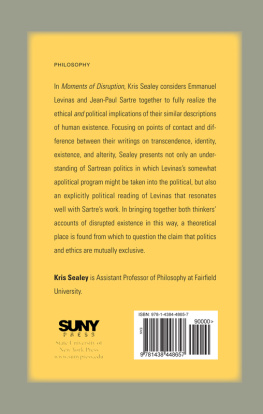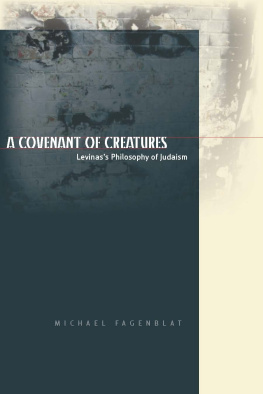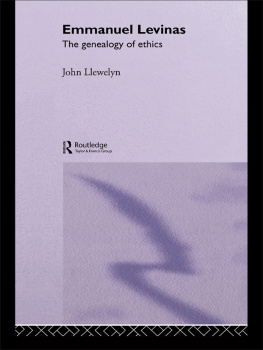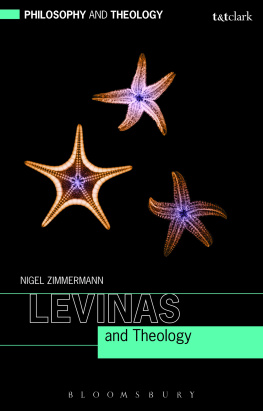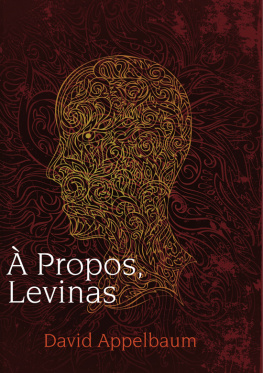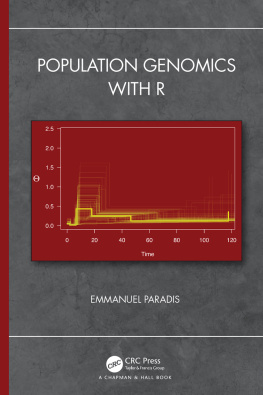Lévinas Emmanuel - Emmanuel Lévinas : a philosophy of exile
Here you can read online Lévinas Emmanuel - Emmanuel Lévinas : a philosophy of exile full text of the book (entire story) in english for free. Download pdf and epub, get meaning, cover and reviews about this ebook. City: London, year: 2012, publisher: Bloomsbury Academic;Continuum, genre: Religion. Description of the work, (preface) as well as reviews are available. Best literature library LitArk.com created for fans of good reading and offers a wide selection of genres:
Romance novel
Science fiction
Adventure
Detective
Science
History
Home and family
Prose
Art
Politics
Computer
Non-fiction
Religion
Business
Children
Humor
Choose a favorite category and find really read worthwhile books. Enjoy immersion in the world of imagination, feel the emotions of the characters or learn something new for yourself, make an fascinating discovery.
- Book:Emmanuel Lévinas : a philosophy of exile
- Author:
- Publisher:Bloomsbury Academic;Continuum
- Genre:
- Year:2012
- City:London
- Rating:5 / 5
- Favourites:Add to favourites
- Your mark:
- 100
- 1
- 2
- 3
- 4
- 5
Emmanuel Lévinas : a philosophy of exile: summary, description and annotation
We offer to read an annotation, description, summary or preface (depends on what the author of the book "Emmanuel Lévinas : a philosophy of exile" wrote himself). If you haven't found the necessary information about the book — write in the comments, we will try to find it.
Emmanuel Lévinas : a philosophy of exile — read online for free the complete book (whole text) full work
Below is the text of the book, divided by pages. System saving the place of the last page read, allows you to conveniently read the book "Emmanuel Lévinas : a philosophy of exile" online for free, without having to search again every time where you left off. Put a bookmark, and you can go to the page where you finished reading at any time.
Font size:
Interval:
Bookmark:

Emmanuel Levinas
Bloomsbury Studies in Continental Philosophy
Bloomsbury Studies in Continental Philosophy is a major monograph series from Bloomsbury. The series features first-class scholarly research monographs across the field of Continental philosophy. Each work makes a major contribution to the field of philosophical research.
Adornos Concept of Life, Alastair Morgan
Adornos Poetics of Critique, Steven Helmling
Badiou and Derrida, Antonio Calcagno
Badiou, Marion and St Paul, Adam Miller
Being and Number in Heideggers Thought, Michael Roubach
Crisis in Continental Philosophy, Robert Piercey
Deleuze and the Genesis of Representation, Joe Hughes
Deleuze and Guattari, Fadi Abou-Rihan
Deleuze and Guattaris Philosophy of History, Jay Lampert
Derrida, Simon Morgan Wortham
Derrida and Disinterest, Sean Gaston
Derrida: Ethics Under Erasure, Nicole Anderson
Domestication of Derrida, Lorenzo Fabbri
Encountering Derrida, Simon Morgan Wortham
Foucaults Heidegger, Timothy Rayner
Foucaults Legacy, C. G. Prado
Gabriel Marcels Ethics of Hope, Jill Graper Hernandez
Gadamer and the Question of the Divine, Walter Lammi
Gilles Deleuze, Constantin V. Boundas
Heidegger and Authenticity, Mahon OBrien
Heidegger and Happiness, Matthew King
Heidegger and a Metaphysics of Feeling, Sharin N. Elkholy
Heidegger and Philosophical Atheology, Peter S. Dillard
Heidegger and the Place of Ethics, Michael Lewis
Heidegger Beyond Deconstruction, Michael Lewis
Heidegger, Politics and Climate Change, Ruth Irwin
Heideggers Early Philosophy, James Luchte
In the Shadow of Phenomenology, Stephen H. Watson
Irony of Heidegger, Andrew Haas
Kant, Deleuze and Architectonics, Edward Willatt
Merleau-Pontys Phenomenology, Kirk M. Besmer
Michel Henry, Jeffrey Hanson
Nietzsche and the Anglo-Saxon Tradition, Louise Mabille
Nietzsches Ethical Theory, Craig Dove
Nietzsches Thus Spoke Zarathustra, James Luchte
Phenomenology, Institution and History, Stephen H. Watson
Ricoeur and Lacan, Karl Simms
Sartres Phenomenology, David Reisman
Simultaneity and Delay, Jay Lampert
Thinking Between Deleuze and Kant, Edward Willatt
Whos Afraid of Deleuze and Guattari? Gregg Lambert
iek and Heidegger, Thomas Brockelman
Emmanuel Levinas
A Philosophy of Exile
Abi Doukhan

Bloomsbury Academic
An imprint of Bloomsbury Publishing Plc
50 Bedford Square London WC1B 3DP UK
175 Fifth Avenue New York NY 10010 USA
www.bloomsbury.com
First published 2012
Abi Doukhan, 2012
All rights reserved. No part of this publication may be reproduced or transmitted in any form or by any means, electronic or mechanical, including photocopying, recording, or any information storage or retrieval system, without prior permission in writing from the publishers.
Abi Doukhan has asserted his/her right under the Copyright, Designs and Patents Act, 1988, to be identified as Author of this work.
No responsibility for loss caused to any individual or organization acting on or refraining from action as a result of the material in this publication can be accepted by Bloomsbury Academic or the author.
British Library Cataloguing-in-Publication Data
A catalogue record for this book is available from the British Library.
ISBN: 978-1-4411-0225-6
Library of Congress Cataloging-in-Publication Data
Doukhan, Abi.
Emmanuel Levinas : a philosophy of exile / Abi Doukhan.
p. cm. (Continuum studies in Continental philosophy)
Includes bibliographical references (p. ) and index.
ISBN 978-1-4411-9576-0 (hardcover) ISBN 978-1-4411-3624-4 (ebook pdf) 1. Levinas, Emmanuel. 2. Other (Philosophy) I. Title.
B2430.L484D68 2012
194dc23
2012010141
Contents
Acknowledgments
This book had its beginnings in my dissertation, which I defended in 2008 at the University of Paris X-Nanterre under the direction of Catherine Chalier. My first words of gratitude go out to her, for the inspiration of her own work and teachings, her infinite patience as I tentatively developed as a writer and thinker over the years of dissertation writing, her impeccable intellectual integrity in her evaluation and critique of my work, and finally, the risk she took in taking me on as a PhD candidate coming from the United States and still rather new to the French academic scene.
My journey into the philosophy of Emmanuel Levinas did not begin in France, however, but rather in the American Midwest, at Michigan State University where I first encountered philosophy. I am deeply indebted to Professor Richard Petersen for his keen intuition of my philosophical persona and interests and for his orienting me to the philosophy of Emmanuel Levinas. I owe him the beginnings of my philosophical journey and am grateful to him for this. I thank him also for directing my BA thesis thereby nurturing my first philosophical attempts at the philosophy of Levinas. Finally I am grateful for my entire experience as a student of philosophy in a department which played a great part in kindling in me a passion for philosophical concepts and ideas.
The ensuing two-year experience of studying philosophy at the University of Paris IV-Sorbonne and the privilege of listening to some of the most beautiful ex-catedra lectures on French philosophy remains one of the most beautiful experiences of my life. My fond memories go back to Professor Marquet for his humble and unassuming yet brilliant presence and teachings on the philosophies of Hegel and Bergson. I also remember with pleasure the classes of Jean-Luc Marion and his uncanny way of trudging through medieval texts tailed by an amphitheater of 300 students. I owe him the art of struggling with a text and a meticulous attention to the written word. Finally, I recall fondly Professor Darriulat for his entranced and passionate presentations on Greek philosophy.
The next seven years as a PhD candidate at the University of Paris X-Nanterre were a baptism of fire whereby I morphed from a mere lover of wisdom to a philosophy professional. I am indebted to the philosophy department for accepting me as a candidate at a very late notice. I also recall with pleasure the classes of Catherine Chalier and Didier Frank whose unassuming scholarship and attention to text have stayed with me ever since. I also want to thank Professors Emmanuel Housset, Jean-Michel Salanskis, and Edvard Kovac for accepting to be members of my dissertation committee and for making my defense a memorable experience. I especially fondly recall the gentlemanly gesture of Dr Kovac who, during the break, offered his handkerchief to dry my hands as I shakily came back from the womans room.
My first job on American soil was offered to me by Elon University. I am deeply indebted to the Elon philosophy department for believing in me and for nurturing my first steps as a young philosophy professional. I am especially grateful to Elsebet Jegstrup for her friendship and mentoring, as well as to Ann Cahill for seeing my potential and walking me through my first book proposal. I recall with pleasure the many conversations on Levinas philosophy with other members of the philosophy department which played an important role in my fine-tuning certain ideas and arguments. Finally, I am indebted to Elon Universitys 2010 Spring Term Levinas class for serving as guinea pigs for my first explication of what would constitute the major themes of this book. Their intellectual curiosities as well as the sharpness of their questions and critiques have been very helpful in articulating the initial draft of this book.
Font size:
Interval:
Bookmark:
Similar books «Emmanuel Lévinas : a philosophy of exile»
Look at similar books to Emmanuel Lévinas : a philosophy of exile. We have selected literature similar in name and meaning in the hope of providing readers with more options to find new, interesting, not yet read works.
Discussion, reviews of the book Emmanuel Lévinas : a philosophy of exile and just readers' own opinions. Leave your comments, write what you think about the work, its meaning or the main characters. Specify what exactly you liked and what you didn't like, and why you think so.


